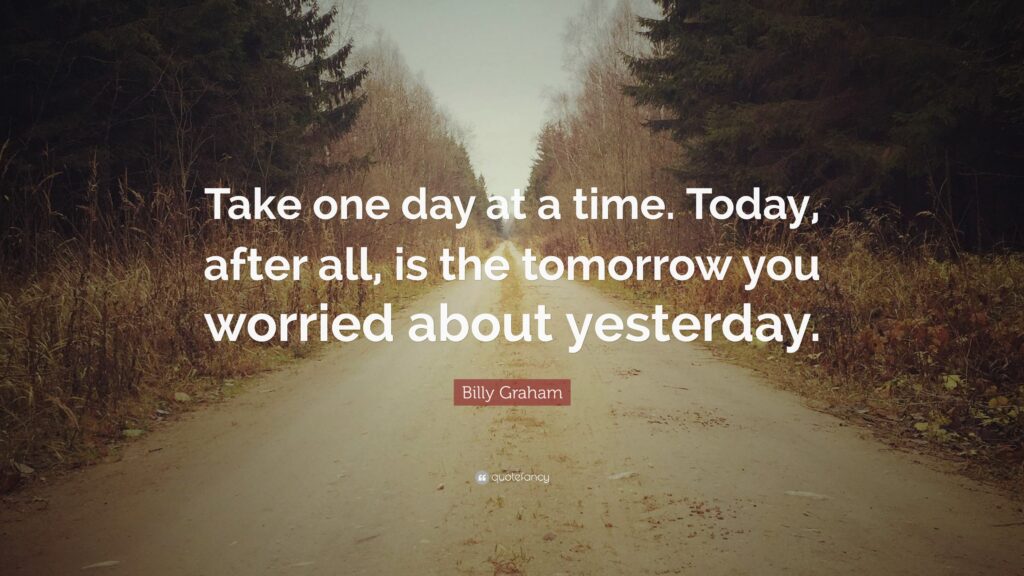When life gets difficult and unbearable, sometimes your only option is to take things “one day at a time.”
You can’t change everything overnight – and you can’t change yourself overnight.
Self-improvement is constantly reminding yourself of the power of taking baby steps.
A small step forward is better than nothing at all, and how you identify that “small step” is important too.
What does a small step forward look like for you?
Everyone is at different stages in life with different circumstances…
For one person, “one day at a time” can apply to going to the gym or exercising. For another, “one day at a time” may just mean getting through the day without having a nervous breakdown.
No matter what the path forward is, change can only happen on a day-to-day basis. Long-term growth is slow and gradual.
When things are not going well in life, it can be especially difficult to try to plan ahead or even think about the future.
You have to teach yourself to “zoom in” and focus on what’s in your immediate power and control.
Think as small as possible. What can you realistically accomplish today – even if it’s just getting through the day?
For a recovering alcoholic or drug addict, “one day at a time” means going another day staying clean and healthy.
That’s easier said than done.
But in fact, a new study published in the American Journal of Psychiatry highlights the importance of this approach. They found that a “one day at a time” mantra may help recovering alcoholics find the strength to go another day.
Researchers looked at the brains of recovering alcoholics. They found that the longer a person had been abstinent from drinking (between only 1 day to 2 weeks), the more changes were found in the ventromedial prefrontal cortex and striatum, a brain network that is linked to self-control and decision-making.
The first day making a change is one of the biggest and hardest, but staying consistent is essential too.
You have to give your brain time to adjust to your new habits – allowing neuroplasticity to occur. Then the new habit will become easier and easier, until it is second-nature.
But until then, you have to take it “one day at a time.”
That includes being super patient with yourself during the early stages of self-change.
If you go a few days without drinking, but then you slip back and drink one day – don’t use that as a “reason” or “excuse” to completely snap back to your old ways.
Psychologists sometimes call this the “what the hell!” effect. This is when someone who is trying to change a habit makes a single mistake, then they think that resets their entire progress, so they give up trying to change at all.
This is why a “one day at a time” approach is so important.
Whether you’re just starting to change a habit, or you’ve already been going steady for 30 days, the most important thing is what you choose to do today.
No matter where you are in life, today is where all your power is.
Technically, we have no choice but to take things “one day at a time.” But we forget this simple fact.
Instead, we spend our time worrying about things in our past that we no longer have control over, or thinking about things in our future which are distant and out of reach.
While there is plenty to learn from analyzing the past and planning our future, at the end of the day: the place of action is today. And it always will be.
When you go “one day at a time,” your progress continues to build gradually and slowly. Then one day you look back – a month, year, or decade later – and notice just how much progress you really made.
But that starts today, not yesterday or tomorrow.
Focus on the moment and practice moving slower. Take the smallest step in the right direction, then keep going.
One day at a time.
This article was written by Steven Handel, founder of The Emotion Machine, an educational website dedicated to self-improvement in the 21st century.
